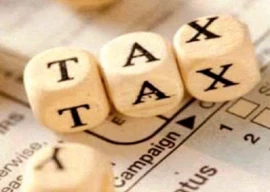
The government was forced to drop the proposed flood levy on the imports and a one-time tax on bank deposits of the general public after the International Monetary Fund (IMF) and the main stakeholders opposed them.
The extreme steps that the finance ministry wanted to take in an effort to raise billions of rupees in additional revenue on which the federal government would have the exclusive right were viewed as highly regressive in the financial sector.
The government caved in after not only the IMF, but also the commerce ministry and the State Bank advised it against going for the extreme measures owing to their adverse implications on the economy and the banking system.
“The proposals were shared with the IMF during the recent talks [related to the completion of the ninth review of a $6.5 billion loan programme],” highly placed sources told The Express Tribune.
Moreover, the plan to impose the flood levy in the range of 1% to 3% on the imports was in violation of Pakistan’s commitments under the World Trade Organization (WTO) and the General Agreement on Trade and Tariff (GATT).
Initially, the finance ministry had made both the proposals as part of eight to 10 measures that were under consideration for raising Rs170 billion in taxes in four months, having an annualised impact of over Rs500 billion.
A senior finance ministry official confirmed that both the measures have now been dropped.
After addressing a news conference on Friday, Finance Minister Ishaq Dar had said that the government would decide about the potential areas of taxation out of a list of eigth to 10 items.
The list included the 0.6% withholding tax on cash withdrawals by non-filers and 1% increase in the General Sales Tax rate to 18%. The 1% increase in GST would fetch Rs70 billion in just four months alone.
Despite the State Bank not in favour of imposing taxes on cash withdrawals, the government is likely to move ahead with its plan to reintroduce the 0.6% tax. This step may once again increase currency circulation.
The measures such as taxes on cash withdrawals or deposits are regressive in nature and are contrary to the principle of equitable and fair income-based taxation. However, the Federal Board of Revenue and the Pakistan Muslim League-Nawaz government have historically been seen favouring such steps.
The finance ministry’s plan to impose a one-time levy on the bank deposits was an unusual move and it could have compelled people to keep their money outside the banking system. The still under-consideration proposal to impose 0.6% withholding tax on the deposits could also lead to increase in the currency circulation.
As of end December 2022, the total banking system deposits amounted to around Rs22.5 trillion, according to the SBP’s statistics. These include Rs10.5 trillion personal deposits held by salaried persons, businessmen and others.
“The government wanted to target only a class of people having higher deposits,” said the sources. This suggests that that the finance ministry’s primary focus is to raise taxes at the expense of huge implications for various sectors of the economy.
In its post-visit statement, the IMF has emphasised “permanent” revenue measures, which can immediately increase tax collection and also withstand court scrutiny.
The sources said that the government also shared the plan to impose a 1% to 3% flood levy on the imports to raise roughly Rs60-70 billion in additional taxes with the IMF. However, the IMF did not endorse it.
Initially, the proposal was to impose 1% to 3% additional customs duties, which the finance ministry converted into a levy aimed at keeping the money outside the reach of the provinces.
“Import duties” are part of the Federal Divisible Pool that is being distributed among the provinces and the Centre. But “levy” is a federal tax that is not shared with the provinces.
The sources said that the IMF had a detailed meeting with the representatives of the WTO, the Ministry of Commerce and the Ministry of Finance. There was a clear view in that meeting that the flood levy would be in violation of the World Trade Organization commitments.
A customs official told the IMF that the term “levy” was not a duty. Similarly, imported goods cannot be discriminated against by not charging a similar tax on domestic goods.
The products of the territory of any contracting party imported into the territory of any other contracting party shall not be subject, directly or indirectly, to internal taxes or other internal charges of any kind in excess of those applied, directly or indirectly, to like domestic products, according to the General Agreement on Trade and Tariffs.





















COMMENTS (6)
Comments are moderated and generally will be posted if they are on-topic and not abusive.
For more information, please see our Comments FAQ